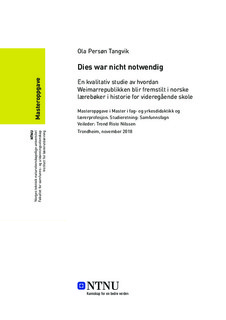Dies war nicht notwendig
Master thesis
Permanent lenke
http://hdl.handle.net/11250/2598830Utgivelsesdato
2018Metadata
Vis full innførselSamlinger
- Institutt for lærerutdanning [3692]
Sammendrag
SammendragI denne masteroppgaven tar jeg for meg hvordan Weimarrepublikken blir formidlet i norske lærebøker i historie for videregående skole. Jeg tar for meg hvordan Weimarrepublikken kan tjene som et historisk eksempel på demokratier som dør og hvordan eksempelet Weimarrepublikken kan passe inn i en ny læreplan i historie fra 2020.
Analysen gjennomføres som en kvalitativ innholdsanalyse av de fem lærebøkene i historie for videregående skole som er i salg i dag.
Mine funn viser at formidlingen av Weimarrepublikken er i de fleste lærebøkene deterministisk, det betyr at historien i stor grad formidles som en rekke tvangsfølger uten noen reel mulighet for menneskelig påvirkning. En slik formidling pulveriserer det menneskelige ansvaret, og kan bidrar til å hindre elevene i å lære noe viktig og universelt om demokratiets forutsetninger og utfordringer, både da og nå. Jeg finner i min analyse at flere av bøkene har Hitler og NSDAP som utgangspunkt for sin formidling, noe som får en rekke uheldige utfall for formidlingen.
Ved å undersøke det som så langt har kommet fram om de nye læreplanene i historie, argumenterer jeg for at Weimarrepublikken som et historisk eksempel på et demokrati som dør vil kunne passe godt inn under en ny læreplan som i større grad sammenblander samfunnsfaget og historiefaget for å skape mening og innhold. Jeg argumenterer også for at en tematisk formidling, i stedet for en kronologisk formidling, vil være det beste for å behandle et tema som Weimarrepublikken. AbstractIn this master thesis I have analysed how the Weimar republic is being mediated in Norwegian textbooks for High School. How can the Weimar republic serve as an historical example of a democracy that dies? I have also looked at how the example of the Weimar republic can fit in under a new history curriculum that will be implemented in Norway in 2020.The analysis has been completed as a qualitative content analysis of the five textbooks that is available for sale (2018).The mediation of the Weimar republic is in most of the textbooks deterministic, that means that the history is mediated as a series of necessary consequences, without any real possibility for politicians and other agents to influence or change the course of history. This type of mediation prevents the students from learning something substantially and universal about democracy’s challenges and preconditions, then and now. I also find that Adolf Hitler and the NSDAP plays a big part in most of the text books mediations about the Weimar republic, this gives some unfortunate implications for the mediation. This find is in line with other studies of the same textbooks regarding how they mediate holocaust.
